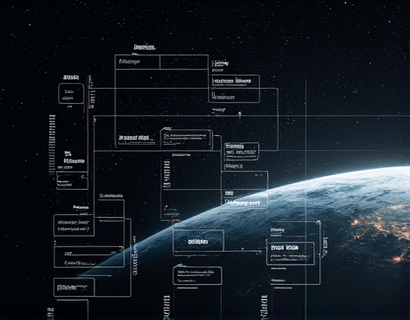Maximizing Civic Engagement: Leveraging Real-Time Data for Transparent Governance
In the digital age, the intersection of technology and governance has opened new avenues for civic engagement. Real-time data access stands as a pivotal tool in transforming how governments operate and how citizens participate in the democratic process. This article delves into the transformative power of real-time data in governance, highlighting how open data initiatives can drive informed citizen participation and enhance accountability in democratic processes. By making government information readily available and accessible, these initiatives empower citizens to engage more deeply, fostering a collaborative and accountable government.
The Importance of Transparency in Governance
Transparency is the cornerstone of trust in any democratic system. When government operations are open and accessible, citizens can better understand how decisions are made and how public resources are utilized. Real-time data plays a crucial role in achieving this transparency. It ensures that information is not only available but also up-to-date, allowing citizens to monitor government activities in real time. This immediacy is vital for maintaining public trust and ensuring that government actions align with citizen expectations and needs.
Transparency also fosters accountability. When government data is openly accessible, it becomes easier to track the performance of public officials and institutions. Citizens can scrutinize spending, policy implementation, and service delivery, holding authorities accountable for their actions. This accountability is essential for preventing corruption and ensuring that public resources are used efficiently and effectively.
Real-Time Government Data: A Game Changer for Civic Engagement
The availability of real-time government data revolutionizes civic engagement by providing citizens with the tools they need to participate actively in governance. Open data initiatives make it possible for individuals to access a wide range of information, from budget allocations and project progress to environmental data and public health statistics. This open access empowers citizens to make informed decisions, engage in meaningful discussions, and take part in the democratic process with a deeper understanding of the issues at hand.
Real-time data also facilitates grassroots movements and community initiatives. Activists and local organizations can use this data to identify issues, mobilize support, and advocate for change. For example, real-time traffic data can help residents identify congestion points and propose solutions, while air quality data can spur local campaigns for cleaner environments. These initiatives not only enhance civic engagement but also lead to tangible improvements in community well-being.
Enhancing Informed Citizen Participation
Informed citizen participation is the backbone of a healthy democracy. Real-time data enables citizens to stay informed about government activities and policies, allowing them to contribute meaningfully to public discourse. With access to timely information, citizens can provide feedback, suggest improvements, and collaborate with policymakers to address community needs. This two-way communication fosters a more inclusive and responsive governance model.
Moreover, real-time data can bridge the gap between different demographic groups. By making information accessible to all, regardless of socioeconomic status, education level, or geographic location, open data initiatives promote equity in civic engagement. Marginalized communities can leverage this data to advocate for their rights and ensure their voices are heard in the decision-making process.
Case Studies: Successful Real-Time Data Initiatives
Several cities and countries have successfully implemented real-time data initiatives, demonstrating the positive impact on civic engagement and governance. One notable example is the City of Barcelona, which has embraced open data to enhance transparency and citizen participation. The city's data portal provides access to a vast array of datasets, including transportation, environmental monitoring, and public services. This has led to innovative applications and services developed by citizens and developers, such as apps for reporting potholes and monitoring public Wi-Fi availability.
Another example is the Open Data Initiative in New York City, which has transformed how the public interacts with government data. The NYC Open Data platform offers over 250 datasets on topics ranging from crime statistics to budget expenditures. This transparency has empowered citizens to create data-driven projects, such as visualizations of crime trends and analysis of public health outcomes. These projects not only inform the public but also provide valuable insights to policymakers.
Challenges and Solutions in Implementing Real-Time Data Initiatives
While the benefits of real-time data in governance are clear, implementing such initiatives comes with its own set of challenges. One major hurdle is the technical infrastructure required to collect, process, and disseminate data in real time. Governments need to invest in robust IT systems and ensure data quality and security. Collaboration with tech experts and private sector partners can help overcome these technical challenges.
Another challenge is ensuring that the data is accessible and usable for the general public. Data must be presented in a user-friendly format, with clear explanations and visualizations. Training and support programs can help citizens and community organizations effectively utilize real-time data. Additionally, addressing privacy concerns is crucial. Governments must implement strict data protection measures to maintain public trust and comply with privacy regulations.
Building a Collaborative and Accountable Government
The ultimate goal of real-time data initiatives is to create a collaborative and accountable government. By providing transparent and accessible information, governments can build stronger relationships with citizens. This transparency fosters a culture of trust and cooperation, where citizens feel empowered to contribute to the governance process. Real-time data serves as a tool for continuous improvement, allowing governments to respond quickly to citizen feedback and make data-driven decisions.
Furthermore, real-time data can enhance the efficiency and effectiveness of public services. For instance, real-time traffic data can optimize public transportation routes, reducing congestion and travel times. Environmental data can inform urban planning and sustainability initiatives, leading to greener and more livable cities. By leveraging real-time data, governments can deliver services that are more responsive to the needs of their citizens.
Encouraging Citizen Participation Through Technology
Technology plays a crucial role in encouraging citizen participation in governance. Online platforms and mobile applications can facilitate real-time engagement, making it easier for citizens to provide feedback, report issues, and participate in decision-making processes. These tools should be designed with user experience in mind, ensuring they are accessible and intuitive for all users.
Social media and other digital communication channels can also amplify citizen voices. Governments can use these platforms to share real-time data, engage in public discussions, and solicit input on policy proposals. By maintaining an active online presence, governments can stay connected with citizens and foster a sense of community and shared responsibility.
Conclusion: Embracing a Transparent and Participatory Governance Model
The integration of real-time data into governance represents a significant step towards a more transparent and participatory democratic system. By making government information openly accessible, governments can empower citizens to engage more deeply in the democratic process. This transparency and accessibility not only enhance accountability but also drive informed citizen participation, leading to better governance outcomes.
As more cities and countries adopt real-time data initiatives, the potential for positive change grows. It is essential for governments, citizens, and technology experts to collaborate in this endeavor, ensuring that the benefits of real-time data are fully realized. By embracing this transformative approach, we can build a future where governance is not only transparent and accountable but also inclusive and responsive to the needs of all citizens.










































